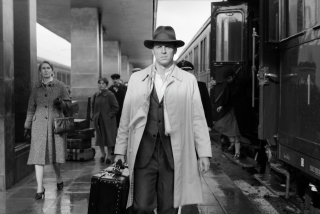MOVIE REVIEW : Crackpot Adolescence of ‘Five Corners’
- Share via
Writers often reinvent their adolescence endlessly, and, in “Five Corners” (selected theaters) John Patrick Shanley, reshapes his in an amusingly crackpot way.
The movie is set in the East Bronx in 1964, and the main character seems an obvious Shanley surrogate. But the experiences he goes through have the matter-of-fact craziness of big-city life. Mad things keep happening--trysts on elevator tops, penguins waddling through bars, baroque gunfights--and the characters accept them with the deadpan pragmatism of hard-case city-dwellers.
Shanley draws himself as tough but sensitive Irish-American kid Harry Fitzgerald (Tim Robbins), who, after seeing Martin Luther King’s “I Have a Dream” speech on TV, undergoes a pacifist metamorphosis and joins the civil rights movement. Immediately, like most movie pacifists, he’s faced with a violent crisis: the return from jail of neighborhood bully Heinz Sabantino (John Turturro.)
Heinz--another of Shanley’s glowering, primal Italian-American studs--is a tormented maniac who shoots off menace like toxic waste glow. Jailed for the attempted rape of neighborhood beauty Linda (Jodie Foster), Heinz despises Harry, the man who stopped the rape then but now says that he loves him--that he loves everybody.
“I always been bad, and you always been good,” Heinz furiously tells Harry--and we can see the characters are psychic partners in a dialectic of love and violence, justice and evil.
This is the core of the plot--but what keeps it alive are the oddball elements: Heinz’ batty mother, Linda’s crippled but truculent boyfriend, the penguins, two wandering pranksters and a mysterious avenger with a bow and arrow who assassinates algebra teachers.
“Five Corners” doesn’t have the glossily lissome stylization of Shanley’s “Moonstruck” script, but it jumps and lunges with the stabbing profanity and threat that Shanley’s plays have: thinly covering up a desperately sweet romanticism.
The story mixes up conflicting styles. Part of it is semi-autobiographical comedy-drama with dead-on accurate jargon and manners. Part of it is an absurdist Western, complete with black-hearted villains, damsels in distress, comical sheriffs and phantom Indians.
And there’s a little bit of “White Heat” and “King Kong.” Shanley, a writer who finds romance in unlikely places, likes to make love stories between violent, secretly romantic toughies and hilariously pragmatic women, and, in a way, Turturro and Jodie Foster fill those roles here. But Foster has been slighted; she spends the last part of the movie like Fay Wray, being carried around by an ape.
Tony Bill both co-produced and directed the film--and, though he’s done a superb job here as a producer, he may be miscasting himself as a director. There’s something drab and ordinary about his visual style, and, though he’s cast excellent actors, he never really gets an ensemble rhythm going--and some of the performances suffer.
Turturro’s Heinz is one of the movie’s best acting jobs--along with Elizabeth Berridge’s glue-sniffing Melanie, Gregory Rozakis’ monomaniac flatfoot and Eriq La Salle’s dour Student Nonviolent Coordinating Committee worker. Turturro won an Obie in a similar if more sympathetic role in Shanley’s “Danny and the Deep Blue Sea,” and he seethes with intensity here, too. But after a while, he seethes so hard it’s as if he’s trying to bench-press the movie.
Bill doesn’t seem to have structured this material enough. The crazy elements seem merely deranged--whereas, in “Moonstruck” or Shanley’s stage plays, there’s an incantatory swell and framework beneath the verbal and physical violence. Bill’s style is too straightforward, uninflected, impersonal. If the movie were more consciously theatrical, we might accept nutty scenes like the one where rape victim Linda trots off to meet her assailant at midnight, alone. Instead, the mood shifts sluggishly from mundane to lunatic, wit to wooziness.
Even so, Shanley’s bent romanticism is strongly in evidence here. At its best, the weird little Bronx Western-moral fable has electric sass, unfazed morality and sweet, tough jolts.
More to Read
Only good movies
Get the Indie Focus newsletter, Mark Olsen's weekly guide to the world of cinema.
You may occasionally receive promotional content from the Los Angeles Times.









